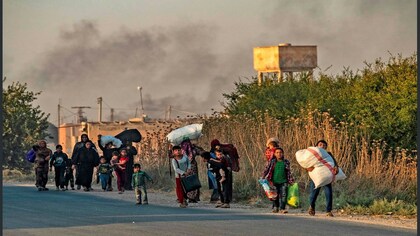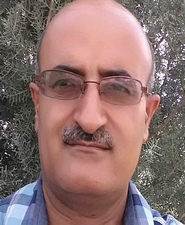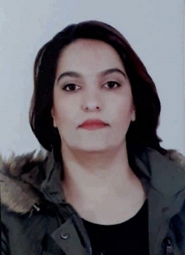Gulf states show rising confidence to rattle Iran
15:31 - 19 January 2012

For leaders on the Iranian side of the Gulf, the past days have offered some hard lessons in the politics of oil.
The Iranians have watched as frustrated bystanders while the leader of its most influential ally, China, began a tour of Gulf Arab states with talks in Tehran\'s top regional rival Saudi Arabia. Two other major Iranian oil customers - South Korea and Japan - also had high-level delegations in the Gulf to discuss supply guarantees if they fall in line with U.S.-led pressures to cut back on Iranian imports.
Iran sharply warned its neighbors about making any deals that could undercut its critical oil income. The Gulf rulers barely blinked.
That highlights the growing confidence among the Gulf Arabs - all close U.S. allies - to stand up against Iran and use tougher tactics in what they view as the region\'s hard-boiled realities: Any gain for Shiite power Iran is perceived as a loss for its Sunni rivals led by Saudi Arabia.
The stronger Gulf political posture is unlikely to stray too far from Washington\'s stances, but it reflects the wider changes for the Gulf\'s monarchs and sheiks after the Arab Spring revolts. In the past year, the wealthy Gulf states have gone into overdrive against any possible internal threats to their own autocratic systems.
They also sense an opportunity to rattle Iran, which is being squeezed by tighter sanctions over its nuclear program and by seeing its main Middle East partner, Syrian President Bashar Assad, struggle with growing street protests and mutinies among his security forces.
\"The Gulf states had long looked to Washington to be their protector,\" said Sami Alfaraj, director of the Kuwait Center for Strategic Studies. \"They still have the U.S., but the Gulf is increasingly looking around and saying: \'We need to take care of ourselves, too.\'\"
Gulf leaders are studying proposals for closer defense cooperation after Saudi-led forces came to the aid last year of Bahrain\'s monarchy, which claims that Iran has help stir an uprising by the island kingdom\'s Shiite majority against the minority Sunni rulers. Statements against Iran by the Gulf\'s six-nation political bloc - which also includes Kuwait, Qatar, Oman and the United Arab Emirates - also have grown increasingly harsh, including recriminations about Iran seeking to destabilize the region.
In Abu Dhabi last week, the United Arab Emirates\' foreign minister, Sheik Abdullah bin Zayed Al Nahyan, said Iran was imperiling the interests of the entire world by threatening to close the Strait of Hormuz, the water route for about one-sixth of the global oil flow. He was joined by Japanese Foreign Minister Koichiro Gemba, who said his country was \"watching the developments in the Strait of Hormuz very carefully and with concern.\"
Iran threatened to close the waterway over new U.S. sanctions, which have been approved by President Barack Obama with at least a six-month delay before they will be implemented. The sanctions target Iran\'s central bank and oil exports.
Saudi officials, meanwhile, have refused to publicly accept Iran\'s claims that it has no link to an alleged plot to kill the Saudi ambassador in Washington. Two men, including a suspected member of Iran\'s Quds Force special foreign actions unit, have been charged in New York federal court.
\"The Gulf states are definitely taking a stronger stance against Iran and are using their considerable influence to try to convince others of their Iranian fears,\" said Theodore Karasik, a security expert at the Dubai-based Institute for Near East and Gulf Military Analysis.
Among the points in a joint statement Sunday between Saudi King Abduallah and Chinese Premier Wen Jiabao was a call to make the Mideast free of \"weapons of mass destruction including nuclear weapons.\"
It\'s certainly a reference to Israel, which is believed to have a nuclear arsenal although officials neither confirm nor deny the nation\'s weapons capabilities. But, in the current climate, the message is almost fully directed toward Iran.
A regional arms race is one of the West\'s spinoff worries about a possible Iranian nuclear weapon - with Saudi Arabia looking to countries such as Pakistan to jump-start an atomic weapons program. Already, the Gulf states are awash in mostly American weaponry - including a deal last month to sell $30 billion worth of F-15SA fighter jets to Saudi Arabia - and the Pentagon has significant Gulf resources with warplanes at several bases and the Navy\'s 5th Fleet in Bahrain.
Iran denies it seeks nuclear weapons and says it only wants reactors for energy and research. Iran refuses, however, to abandon its program to enrich uranium, which the U.S. and many allies believe could lead to weapons-grade material.
The latest U.S.-led drive to aim sanctions at Iran\'s oil industry - the source of 80 percent of its foreign currency revenue - has brought sharp backlash from Tehran. On Sunday, Mohammad Ali Khatibi, Iran\'s OPEC governor, was quoted as saying that attempts by Gulf nations to replace Iran\'s output with their own would make them an \"accomplice in further events.\"
\"These acts will not be considered friendly,\" Khatibi told Iran\'s Shargh newspaper.
Khatibi fired another salvo Tuesday in Europe\'s direction. He called a proposed European Union embargo of Iran\'s oil \"economic suicide\" that would deepen the euro zones fiscal crisis, according to the semiofficial Mehr news agency.
But the Gulf tours of the Far East economic powers appeared to put Iran even more on edge.
China, Japan and South Korea are Iran\'s top Asian oil markets - taking an even bigger combined share than the nearly 20 percent that currently goes to Europe. An all-out embargo is highly unlikely. China - one of five veto-wielding permanent members of the U.N. Security Council - has consistently opposed tighter sanctions on Iran and Japan and South Korea appear unwilling to risk possible upheaval in their economies.
Still, pressure is growing for some curbs.
A senior State Department envoy, Robert Einhorn, urged South Korea officials Tuesday to reduce crude oil imports from Iran. South Korea\'s Foreign Ministry said the government hasn\'t yet decided on a course of action, but reportedly is seeking assurances from other oil exporters that they would fill any gaps.
South Korean Prime Minister Kim Hwang-sik joined the Chinese premier in Abu Dhabi for the opening of an alternative energy summit on Monday. They did not mention Iran in public comments, but talks by Kim included top UAE officials who set political and energy policies.
\"Historically, Iran viewed itself as a kind of big brother, a superior power, to the Gulf Arab states. That view has become badly dated,\" said Patrick Clawson, director of research at the Washington Institute for Near East Policy. \"The Gulf states now see themselves as mutual powers in the region who can increasingly stand up for themselves. They survived the Arab Spring without too much trouble - except for Bahrain - and have come out of it more confident and more willing to go head to head with Iran.\"
By BRIAN MURPHY
Source – Tricityherald.com
The Iranians have watched as frustrated bystanders while the leader of its most influential ally, China, began a tour of Gulf Arab states with talks in Tehran\'s top regional rival Saudi Arabia. Two other major Iranian oil customers - South Korea and Japan - also had high-level delegations in the Gulf to discuss supply guarantees if they fall in line with U.S.-led pressures to cut back on Iranian imports.
Iran sharply warned its neighbors about making any deals that could undercut its critical oil income. The Gulf rulers barely blinked.
That highlights the growing confidence among the Gulf Arabs - all close U.S. allies - to stand up against Iran and use tougher tactics in what they view as the region\'s hard-boiled realities: Any gain for Shiite power Iran is perceived as a loss for its Sunni rivals led by Saudi Arabia.
The stronger Gulf political posture is unlikely to stray too far from Washington\'s stances, but it reflects the wider changes for the Gulf\'s monarchs and sheiks after the Arab Spring revolts. In the past year, the wealthy Gulf states have gone into overdrive against any possible internal threats to their own autocratic systems.
They also sense an opportunity to rattle Iran, which is being squeezed by tighter sanctions over its nuclear program and by seeing its main Middle East partner, Syrian President Bashar Assad, struggle with growing street protests and mutinies among his security forces.
\"The Gulf states had long looked to Washington to be their protector,\" said Sami Alfaraj, director of the Kuwait Center for Strategic Studies. \"They still have the U.S., but the Gulf is increasingly looking around and saying: \'We need to take care of ourselves, too.\'\"
Gulf leaders are studying proposals for closer defense cooperation after Saudi-led forces came to the aid last year of Bahrain\'s monarchy, which claims that Iran has help stir an uprising by the island kingdom\'s Shiite majority against the minority Sunni rulers. Statements against Iran by the Gulf\'s six-nation political bloc - which also includes Kuwait, Qatar, Oman and the United Arab Emirates - also have grown increasingly harsh, including recriminations about Iran seeking to destabilize the region.
In Abu Dhabi last week, the United Arab Emirates\' foreign minister, Sheik Abdullah bin Zayed Al Nahyan, said Iran was imperiling the interests of the entire world by threatening to close the Strait of Hormuz, the water route for about one-sixth of the global oil flow. He was joined by Japanese Foreign Minister Koichiro Gemba, who said his country was \"watching the developments in the Strait of Hormuz very carefully and with concern.\"
Iran threatened to close the waterway over new U.S. sanctions, which have been approved by President Barack Obama with at least a six-month delay before they will be implemented. The sanctions target Iran\'s central bank and oil exports.
Saudi officials, meanwhile, have refused to publicly accept Iran\'s claims that it has no link to an alleged plot to kill the Saudi ambassador in Washington. Two men, including a suspected member of Iran\'s Quds Force special foreign actions unit, have been charged in New York federal court.
\"The Gulf states are definitely taking a stronger stance against Iran and are using their considerable influence to try to convince others of their Iranian fears,\" said Theodore Karasik, a security expert at the Dubai-based Institute for Near East and Gulf Military Analysis.
Among the points in a joint statement Sunday between Saudi King Abduallah and Chinese Premier Wen Jiabao was a call to make the Mideast free of \"weapons of mass destruction including nuclear weapons.\"
It\'s certainly a reference to Israel, which is believed to have a nuclear arsenal although officials neither confirm nor deny the nation\'s weapons capabilities. But, in the current climate, the message is almost fully directed toward Iran.
A regional arms race is one of the West\'s spinoff worries about a possible Iranian nuclear weapon - with Saudi Arabia looking to countries such as Pakistan to jump-start an atomic weapons program. Already, the Gulf states are awash in mostly American weaponry - including a deal last month to sell $30 billion worth of F-15SA fighter jets to Saudi Arabia - and the Pentagon has significant Gulf resources with warplanes at several bases and the Navy\'s 5th Fleet in Bahrain.
Iran denies it seeks nuclear weapons and says it only wants reactors for energy and research. Iran refuses, however, to abandon its program to enrich uranium, which the U.S. and many allies believe could lead to weapons-grade material.
The latest U.S.-led drive to aim sanctions at Iran\'s oil industry - the source of 80 percent of its foreign currency revenue - has brought sharp backlash from Tehran. On Sunday, Mohammad Ali Khatibi, Iran\'s OPEC governor, was quoted as saying that attempts by Gulf nations to replace Iran\'s output with their own would make them an \"accomplice in further events.\"
\"These acts will not be considered friendly,\" Khatibi told Iran\'s Shargh newspaper.
Khatibi fired another salvo Tuesday in Europe\'s direction. He called a proposed European Union embargo of Iran\'s oil \"economic suicide\" that would deepen the euro zones fiscal crisis, according to the semiofficial Mehr news agency.
But the Gulf tours of the Far East economic powers appeared to put Iran even more on edge.
China, Japan and South Korea are Iran\'s top Asian oil markets - taking an even bigger combined share than the nearly 20 percent that currently goes to Europe. An all-out embargo is highly unlikely. China - one of five veto-wielding permanent members of the U.N. Security Council - has consistently opposed tighter sanctions on Iran and Japan and South Korea appear unwilling to risk possible upheaval in their economies.
Still, pressure is growing for some curbs.
A senior State Department envoy, Robert Einhorn, urged South Korea officials Tuesday to reduce crude oil imports from Iran. South Korea\'s Foreign Ministry said the government hasn\'t yet decided on a course of action, but reportedly is seeking assurances from other oil exporters that they would fill any gaps.
South Korean Prime Minister Kim Hwang-sik joined the Chinese premier in Abu Dhabi for the opening of an alternative energy summit on Monday. They did not mention Iran in public comments, but talks by Kim included top UAE officials who set political and energy policies.
\"Historically, Iran viewed itself as a kind of big brother, a superior power, to the Gulf Arab states. That view has become badly dated,\" said Patrick Clawson, director of research at the Washington Institute for Near East Policy. \"The Gulf states now see themselves as mutual powers in the region who can increasingly stand up for themselves. They survived the Arab Spring without too much trouble - except for Bahrain - and have come out of it more confident and more willing to go head to head with Iran.\"
By BRIAN MURPHY
Source – Tricityherald.com



